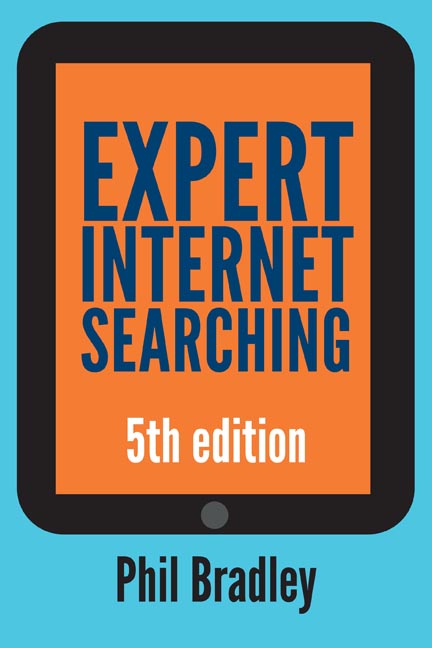Book contents
- Frontmatter
- Contents
- List of figures
- Preface
- Acknowledgements
- 1 An introduction to the internet
- 2 An introduction to search engines
- 3 The world according to Google
- 4 Other free-text search engines
- 5 Directory, clustering and similarity search engines
- 6 Multi- and meta-search engines
- 7 Social media search engines
- 8 Visual and image search engines
- 9 People-based resources
- 10 News-based search engines
- 11 Multimedia search engines
- 12 Specialised search engines
- 13 Hints, tips and the future
- Index
4 - Other free-text search engines
Published online by Cambridge University Press: 09 June 2018
- Frontmatter
- Contents
- List of figures
- Preface
- Acknowledgements
- 1 An introduction to the internet
- 2 An introduction to search engines
- 3 The world according to Google
- 4 Other free-text search engines
- 5 Directory, clustering and similarity search engines
- 6 Multi- and meta-search engines
- 7 Social media search engines
- 8 Visual and image search engines
- 9 People-based resources
- 10 News-based search engines
- 11 Multimedia search engines
- 12 Specialised search engines
- 13 Hints, tips and the future
- Index
Summary
Introduction
If I asked you which reference book you used in your work, you'd probably think that you'd misheard me, because of course you probably use quite a lot of them. Similarly if I asked which professional journal your library subscribed to, you'd think that was an odd question as well. However, in my work as a trainer people often think that just using one search engine is a perfectly acceptable way to work, and a common question that I'm asked is ‘What's the “best” search engine?’
Did you know?
The average person conducts 3.4 searches every day (http://kingkong.com.au/15-secret-facts-google-search-doesnt-want-know).
There is no best search engine, as there is no best reference book or professional journal. We match the appropriate tool to the question that we've been asked, and if we don't get the answer we need, we just simply move onto the next resource until we have been able to come to a conclusion. Search engines are exactly the same. Google is a great search engine, there's no doubt about that, but as we've seen it does have its drawbacks. Consequently it's a good idea to have various alternatives ready to hand if you can't find what you need, or you simply want an alternative viewpoint on your query. This chapter will look at some of those engines, and in common with the approach that I used with Google I'll look at how they can be used, any interesting new search functions and of course, a critical look at their weaknesses.
Bing
Bing is the Microsoft alternative to Google. Microsoft has had a very chequered career with the internet and has tried several previous incarnations of search to try and compete with Google. This is the only one that's really had any success, and it doesn't look as though it's liable to change or be morphed into anything else by Microsoft at the moment. Much of the functionality is the same as Google's offerings and the data collection method is the same; that is to say, spidering websites, copying the contents of pages back to home base and then indexing them.
- Type
- Chapter
- Information
- Expert Internet Searching , pp. 69 - 88Publisher: FacetPrint publication year: 2017



